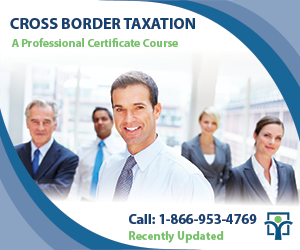Last updated: December 22 2015
Navigating Cross-Border Tax Issues

The new T1135 Foreign Income Verification Statement was released last week, and it requires attention by clients who hold offshore assets. It will be discussed in detail at the Distinguished Advisor Workshops, being held January 20-25, 2016. However, cross-border issues in general present a significant opportunity for tax and financial advisors.
Thanks to Angela Preteau, author of Knowledge Bureau’s Cross-Border Course, there were many “aha” moments at the 2015 Distinguished Advisor’s Conference (DAC), leading to a greater understanding of how to best help clients in these situations. Angela, a Partner at Frostiak & Leslie Chartered Accountants and a CA as well as a CPA licensed in the US, presented a wealth of information at DAC on cross-border tax filing requirements.
According to Angela, clients themselves too often insist on taking the ostrich approach to many of the complex rules—burying their head in the proverbial sand rather than getting in front of these tax issues. But advisors who are in the know on these rules can converse intelligently with their clients about them, and refer clients to the appropriate tax specialists – actions that will increase their value proposition significantly and provide financial relief and peace of mind to their clients.
Some key considerations in discussing cross-border issues with clients, according to Angela:
- Know when and to whom the rules apply; dual-citizen Canadian residents, US citizens resident in Canada, Canadian residents with US pensions, snowbirds with retirement income, and investors with income on both sides of the border can all be impacted significantly—whether they know it or not.
- Be aware of new rules, forms and regulations. Your clients will often not even know that these rules apply to them. It’s your job to be aware of the rules; to understand when to have the discussion; and to seek out the expertise of other professionals to help clients when needed.
- Understand the T1135. What has changed on the new Form 1135 for Canadian investors with foreign assets, and how to report properly is a critical part of your fiduciary duty, whether you are a tax or financial advisor.
- Understand FATCA. Know how to help US citizens in Canada comply with the Foreign Account Tax Compliance Act (FATCA), a tax law enforced by the American government and applying to its citizens with bank accounts anywhere in the world outside of the US. FATCA requires foreign banks to reveal US taxpayer accounts holding $50,000 or more in them.
- Renouncing US Citizenship. Options for, and implications of, renouncing US citizenship are issues that are coming up more often in discussions between advisors and clients. Many US expatriates are making this choice to avoid the increasingly stringent and complicated regulations around US taxation, as well as the potentially costly penalties attached. But even this process is not as straightforward as you might think.
 |
Cross-border tax law is very complicated and the authorities on both sides of the border are getting more and more serious about enforcing it, and about imposing large penalties for non-compliance. Knowing how to recognize when there are potential cross-border tax issues for a client, what the planning options are, and when to tap into the specialized knowledge of other advisors will allow you to help your clients retain more wealth.
For additional information, advisors may take the Cross-Border Taxation Course by Angela Preteau.
For more information about DAW January and DAC 2016 and the outstanding speakers who will line up to speak to the theme SOAR HIGHER: Plan for Your Greater Potential see https://www.knowledgebureau.com/index.php/dac2016.
|
Refer a Friend |
Research |
Calculators |
Course Trials |
 |
 |
 |
 |




